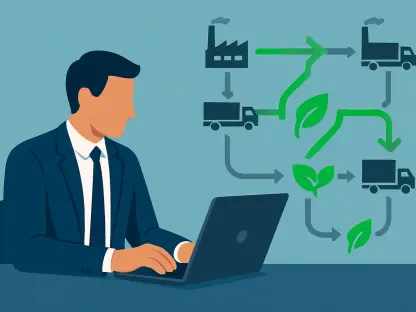The realm of software development faces constant evolution, demanding tools that keep pace with the ever-growing complexity and expectations for efficiency. GitLab Inc. has responded by updating its core continuous integration/continuous delivery (CI/CD) platform, now offering enhanced artificial intelligence (AI), comprehensive artifact management, and fortified security functionalities. These advancements aim to streamline development workflows, enabling teams to focus on innovation while maintaining robust security and compliance.
Enhanced AI Capabilities
Integrating AI for Improved Productivity
GitLab 18’s latest iteration integrates artificial intelligence capabilities that optimize code development processes. This version introduces features like code suggestion and code completion for all clientele, sidestepping the need for a separate GitLab Duo subscription. Such integration reduces dependency on external tools, fostering seamlessness across development environments. While certain advanced features remain exclusive to the Duo offering, GitLab Premium users enjoy unprecedented access without necessitating an upgrade to GitLab Ultimate. This synergy illustrates GitLab’s commitment to making AI-driven productivity enhancements accessible, aligning with industry trends toward automated processes replacing repetitive manual tasks.
The adoption of AI for automating labor-intensive tasks is a significant stride in reducing developer workload. AI’s role in suggesting and completing code facilitates faster coding cycles, cuts down error rates, and assists developers in focusing their efforts on more complex components of the project. Such features not only boost individual productivity but also elevate the overall efficiency of development teams. By embracing AI capabilities, GitLab fosters a conducive environment for developers to innovate and experiment without being bogged down by mundane coding tasks.
AI’s Impact on Workflow Efficiency
As development teams embrace the integration of AI, they find themselves empowered to refine their workflows and better utilize their resources. The enhanced AI functionalities within GitLab 18 are not just about automation, but also about providing intelligent insights that drive decision-making. AI aids in analyzing code patterns, predicting issues, and suggesting optimal solutions, facilitating a more streamlined pipeline that garners higher productivity levels. The challenge remains in discerning which tasks are best suited for AI solutions while ensuring a balanced human-AI collaboration that heightens the software delivery process.
Moreover, the implications of AI integration extend beyond basic coding support. Compliance and security checks can now also be informed by AI, ushering in a new era of intelligent DevSecOps practices. With AI adeptly handling some of the more routine aspects of software development, human resources can be redeployed to focus on strategy and innovation. GitLab’s commitment to advancing AI features emphasizes the platform’s role in shaping a future where automated intelligence forms the backbone of efficient and secure delivery models.
Advanced Artifact Management and Security Controls
Revamping Artifact Management Tools
The development lifecycle necessitates meticulous artifact management, and GitLab’s updates address this need head-on. Enhancing these tools, GitLab 18 introduces immutable tags and a virtual registry for Maven, reflecting best practices in artifact handling and management. These built-in solutions enable teams to maintain a clean and secure management pipeline, ensuring that the right software versions are always accessible and adequately documented. By embedding such essential capabilities directly into the platform, GitLab reduces reliance on third-party solutions, simplifying processes while offering a more integrated DevOps experience.
Immutable tags, in particular, play a crucial role in managing artifact stability by ensuring that released versions cannot be altered retroactively. This feature upholds integrity and reliability across software iterations. Similarly, the virtual registry for Maven streamlines access to files while safeguarding against potential data breaches, aligning with GitLab’s robust security standards. Developers benefit from a more straightforward process, experiencing less friction during artifact retrieval and version control activities.
Fortifying Security Practices
GitLab 18 also places a strong emphasis on security enhancements, recognizing the growing discourse around robust cybersecurity measures in software development. The platform introduces impact assessment tools for security policy changes and implements additional vulnerability dashboards, providing an exhaustive security overview for its users. Supporting passkey features and expanded compliance controls, like ISO 27001 and CIS benchmarks, GitLab actively fortifies security defenses, allowing teams to better anticipate and address vulnerabilities ahead of deployment.
These security improvements illustrate GitLab’s proactive stance, focusing on prevention and real-time monitoring to counteract any potential threats. The emphasis on compliance frameworks ensures alignment with global standards, reducing risks associated with breaches or regulatory non-conformity. As DevOps institutes increasingly adopt secure by design principles, GitLab’s security-centric approach provides teams with essential tools to navigate an often unpredictable cyber landscape safely. The amalgamation of advanced security protocols and diligent artifact management reaffirms GitLab as a cornerstone in developing not only efficient but also secure software products.
Conclusion: A Future Shaped by Intelligent Solutions
The world of software development is in a constant state of flux, requiring tools that can adapt to growing complexity and higher demands for efficiency. GitLab Inc. has responded to these industry shifts by enhancing its core tools for continuous integration and continuous delivery (CI/CD). Their updated platform now includes advanced artificial intelligence (AI) capabilities, improved artifact management, and strengthened security features. These enhancements are designed to optimize development workflows, allowing teams to innovate without sacrificing security or regulatory compliance. As the industry moves forward, the need for seamless integration and fluid collaboration becomes increasingly critical, prompting companies like GitLab to refine their offerings continually. By doing so, they ensure that development teams can remain agile and adaptable, meeting new challenges with cutting-edge solutions while maintaining a steadfast focus on the integrity and security of their processes.









